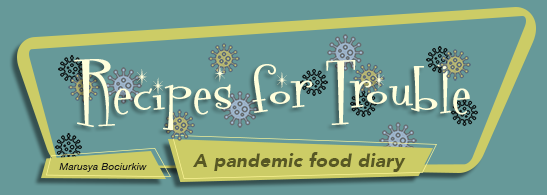Blackout Soup
I’m prepared for all things except emergencies.
When a blackout hit Toronto last week, in minus 20 weather, I felt pretty good about at least having tea lights on hand. They looked kind of sweet arranged around my living room. Flashlight, but no batteries. Tea lights aplenty, but no candles.
Still, with heat still emanating from the radiators, I had pleasant thoughts about days gone by, and old-fashioned things like going to bed early because of no TV and internet (my computer wasn’t charged, either).
I filled up a hot water bottle (there was still hot running water for some reason) and went to bed figuring I’d be woken up at 2 a.m. by lights and TV flicking on.
Woke up to watery morning light and freezing cold.
That’s when I started to freak out. Made some phonecalls. Found out the whole western half of the city was without power – 250, 000 people affected! – and that it might be like that til 10 that evening. Subways closed down. Even my corner Starbucks was closed!
Started worrying about the elderly Ukrainian lady across the street. Irrationally, i grabbed some Lentil Soup with Kale and Sausage out of the freezer and began to suit up to go over there when I realized I’d probably just scare her, this early and anyways, the soup was useless unless I carefully sat it over one of my tea light for about seven hours.
At 9:30 a.m., my power came back on. I could have wept with relief. I turned on the stove and made espresso. A homemade latte never tasted so good. But wait – the old lady – was she even still alive?
I knocked on her backdoor, heavily, officiously. There was a ghost moving behind the frosted glass. She opened the door, dressed in a white nightgown and a kerchief on her head. Her cheeks were flushed with excitement. She waved my soup away brusquely, and then welcomed me in.
Over embroidery pattern mugs of Nescafe, shakily set down on the plastic tablecoth, she told me how she’d padded down to the basement when the lights went out, and, even with hands trembling from Parkinson’s, found a flashlight, loaded it with batteries, and then found her stash of candles too. All her East European lady friends phoned one another on their rotary phones. Early that morning, her son phoned from Mississauga, offering to pick her up, but she gave him the brush-off.
Reminded. Me. Of. The. War. she said. But. Dat. Was. Worse.
In the dim kitchen, light filtered by lace curtains, the characters in The Last Supper looking down on us, she told me about the four years she spent as a slave labourer under the German Occupation, working on a remote farm. Had to learn German, and milk cows, just like that. I was scared, cow was scared, she said with a thin smile.
She served me some cake, too. Showed me photos of her family, most of them dead or lost in the war. It felt so familiar: the stories, the girlish bitterness in her voice, so like my Baba’s kitchen, my Baba’s stories. She told me she’d survived breast cancer, too. All that trauma and grief, stowed away, like a box in the basement, it only gets opened in emergencies.
It. Was. Spooky. she finally admitted, of the blackout. Very. Spooky.
She took my soup, finally. I knew she’d enjoy it.
But really, it was she who fed me, that day.



Lovely story Marusya. Stay warm, girl!